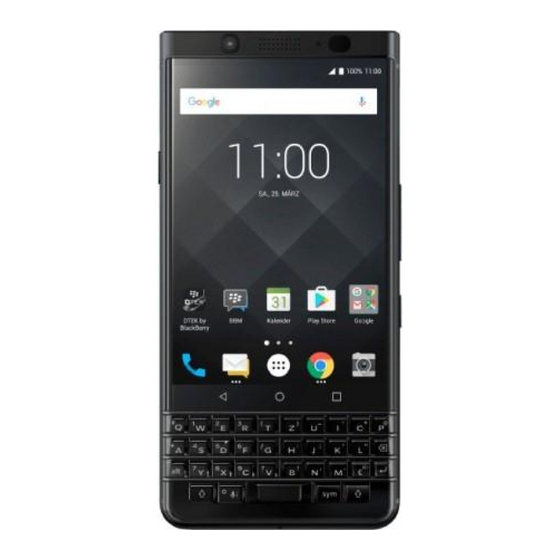Blackberry KEYone Інформація про безпеку та продукцію - Сторінка 6
Переглянути онлайн або завантажити pdf Інформація про безпеку та продукцію для Мобільний телефон Blackberry KEYone. Blackberry KEYone 11 сторінок.
Також для Blackberry KEYone: Посібник з усунення несправностей (7 сторінок), Посібник із швидкого старту (2 сторінок), Інформація про безпеку та продукцію (9 сторінок), Інформація про безпеку та продукцію (9 сторінок), Інформація про безпеку та продукцію (9 сторінок)

Usage or storage of your smartphone or smartphone accessories outside of the recommended
temperature ranges could cause your smartphone to become hot which could result in serious
injury or death, or could cause damage to the smartphone, the accessories, or the lithium-ion
battery.
Keep your smartphone or smartphone accessories away from heat sources, such as radiators,
heat registers, stoves, or other apparatus (including amplifiers) that produce heat. If you are
not going to use your smartphone for more than two weeks, turn off the power.
Smartphone cleaning and repair
Cleaning: Do not use liquid, aerosol cleaners, or solvents on or near your smartphone or
smartphone accessories, including the battery. Clean only with a soft dry cloth. Disconnect
any cables from the computer and unplug any charging accessories from the electrical outlet
before cleaning either your smartphone or the charging accessory.
Repair: Do not attempt to modify, disassemble, or service your smartphone or any charging
accessory. Do not attempt to replace your nonremovable battery. Only qualified service
personnel should perform repairs or battery replacements to your smartphone or charging
accessories, and should use only the battery that the manufacturer specifies for use with your
particular smartphone model.
If any of the following situations occur, disconnect the power supply cables from the computer
or electrical outlet and take your smartphone or charging accessory for service to qualified
service personnel:
• The power supply cord, plug, or connector is damaged.
• Liquid has been spilled or objects have fallen into the smartphone or charging accessory.
• The smartphone or charging accessory has been exposed to rain or water.
• The smartphone or charging accessory becomes very hot to the touch.
• The smartphone or charging accessory has been dropped or damaged in any way.
• The smartphone or charging accessory does not operate normally by following the
instructions in the user documentation.
• The smartphone or charging accessory exhibits a distinct change in performance.
To reduce the risk of fire or electric shock, adjust only those controls that are covered in the
user documentation for your smartphone. An improper adjustment of other controls might
cause damage and will often require extensive work by a qualified technician to restore your
smartphone, charging accessory, or any other accessory to normal operation.
Failure to observe all safety instructions contained in the user documentation for your
smartphone will void the Limited Warranty and might lead to suspension or denial of services
to the offender, legal action, or both.
Smartphone and battery disposal
Do not dispose of either your smartphone or the battery in household waste
bins or in a fire.
Your smartphone and battery are recyclable where facilities exist. This symbol
is not intended to indicate the use of recycled materials. For more information,
please visit the USA and Canada website at www.blackberrymobile.us/recycling
and www.blackberrymobile.ca/recycling.
BlackBerry partners with Call2Recycle to offer a safe and convenient battery
recycling program. For more information on our Battery Recycling Program,
please visit the USA and Canada website at www.blackberrymobile.us/recycling
and www.blackberrymobile.ca/recycling.
Dispose of your smartphone and its battery in accordance with the laws and regulations in
your area governing disposal of such cell types.
Compliance information
Exposure to radio frequency signals
The smartphone radio is a low-power radio transmitter and receiver. It is designed to comply
with the following:
• Federal Communications Commission (FCC) guidelines and limits
• Other relevant international guidelines regarding safety levels of radio frequency exposure
for wireless devices
These guidelines were developed by independent scientific experts, governments, and
organizations including the following:
• The Institute of Electrical and Electronics Engineers Standard (IEEE)
• The National Council on Radiation Protection and Measurements (NCRP)
6
